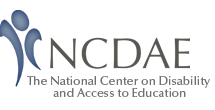NCDAE Accessibility Newsletter - January 2007
In this Edition:
- Articles
- Tips and Tools: Web Captioning
- Webcast: Cognitive Disabilities and the Web
- Factoid
- Upcoming Event: ATIA
- Affiliate Highlight: Dr. Jane West
- In the News: Browser Wars
Articles
Democracy in Action - the Wiki Way
By: Sarah Rule - NCDAE
Jared Smith, a representative of the NCDAE on the Telecommunications and Electronic and Information Technology Advisory Committee (TEITAC), has created a website and wiki that allow users to participate in TEITAC meetings and to contribute to subcommittees and task force activities. This new site allows the public to participate in the democratic process in a nearly unprecedented way.
- Read the full article at http://ncdae.org/resources/articles/wiki.php
- Visit the TEITAC site and wiki at: http://teitac.org
Accessibility of Education in 2007
By: Marty Blair
During 2007 the National Center on Disability and Education (NCDAE) and its affiliates will monitor a number of education-related legislative and policy issues. Included are reauthorization of the No Child Left Behind initiative, implementation of the Individuals with Disabilities Education Improvement Act regulations, implementation of NIMAS, and operation of the NIMAC. We will also monitor into the School 2.0, initiative and participate in the current update of Section 508 of the Rehabilitation Act.
Read the full article at: http://ncdae.org/resources/articles/2007.php.
Tips and Tools: Web Captioning
Captions are synchronized text equivalents of the spoken word and other audio content. They allow the audio content of web multimedia to be accessible to those who do not have access to audio, primarily the Deaf and hard-of-hearing.
NCDAE has created a fact sheet that outlines the principles and potential challenges of captioning for the web. To read this fact sheet visit: http://ncdae.org/resources/articles/captioning.php
Webcast: Cognitive Disabilities and the Web
Upcoming Webcast - January 31, 2007
The National Center on Access and Education (NCDAE) is hosting the webcast titled "Cognitive Disabilities and the Web: What We Think We Know." It will be held Wednesday January 31st, 2007 from 1:00 - 2:00 PM MST. The audio broadcast will last approximately one hour. It is free of charge and will be captioned simultaneously for the deaf and hard of hearing.
The field of accessible Web design has moved in important positive directions in the past decade to improve accessibility to groups of individuals with disabilities, mainly those with sensory and motor impairments. Yet individuals with cognitive disabilities (the greatest numbers within the disability population) have been largely ignored. This is in part due to a lack of consensus in the field about what recommendations should be made. The panel will explore both professional opinion and empirical research across different disciplines to help us determine what recommendations could be provided to the field now, if any.
More information is available at http://ncdae.org/resources/articles/cognitive/.
Factoid
In a report commissioned by the United Nations, the British accessibility company Nomensa announced some staggering statistics. In an international audit of accessibility, only 3% of websites achieved the minimum level of accessibility. Key flaws in the websites tested were:
- 93% did not provide adequate text descriptions for graphical content, causing problems for people who are visually impaired;
- 73% relied on JavaScript for important functionality, making it impossible for an estimated 10% of Internet users to access key information;
- 78% used foreground and background colour combinations with poor contrast, making it difficult for people with mild visual conditions, such as colour blindness, to read information;
- 98% did not follow industry web standards for the programming code, providing poor foundations for web accessibility;
- 97% used fixed units of measurement, preventing people from altering the size of text or comfortably resizing the page so that content can be easily scaled;
- 89% failed to use the correct technique for conveying document structure through the use of headings, making page navigation awkward for many people who are visually impaired;
- 87% caused pop-up windows to appear without warning the user, causing disorientation problems for people using screen magnification software.
To read more about the study, visit:
NCDAE Announces
ATIA
Join us at the 2007 ATIA conference (http://www.atia.org/) in Orlando, Florida January 24th-27th. NCDAE staff will host 2 discussions on Friday, January 26th. They will focus on the accessibility of open source technologies and next-generation web accessibility issues for people with disabilities. We look forward to seeing you there.
Affiliate Highlight
Jane E. West, Ph.D. Vice President Government and External Relations AACTE
Dr. Jane West joined The American Association of Colleges for Teacher Education (AACTE) in February 2006. She directs the department of government and external relations, including communications and public affairs, federal education policy, membership development, and AACTE's relations with its state chapters. West brings over 30 years of education and public policy experience to the organization as a former teacher, education administrator, PTA officer, researcher, and university faculty member. As a founder and principal of Washington Partners, LLC, West provided government relations services to a range of national education organizations. She has served as an independent consultant to numerous non-profits, written and published articles on education policy issues, and edited two books. In higher education, she has taught graduate courses and supervised preservice teachers through affiliations with the University of Maryland, Johns Hopkins University, and the University of San Francisco.
More on Dr West and AACTE can be found at:
http://www.aacte.org/About_Us/jane_west.aspx
In the News: Browser Wars
In the past few months, both Microsoft and upstart rival Mozilla have released new versions of their Internet Browsers - IE7 and Firefox 2.0 respectively. Both claim to have enhanced accessibility features. Many people have strong opinions on their favorites and the associated claims of accessibility. The David and Goliath battle between Firefox and IE7 may have center stage of the browser wars but other contenders such as Opera have thrown their hats into the accessibility ring as well. Will this competition promote general accessibility or create even greater standards problems?
The following are some of the articles on the new generation of browsers that have been featured on the NCDAE RSS feed:
Firefox 2.0 and Access Keys
http://juicystudio.com/article/firefox2-accesskeys.php
Microsoft predicts swift adoption of IE7
http://www.webstandards.org/2006/10/28/microsoft-predicts-swift-adoption-of-ie7/
Browser Updates for October 2006
http://www.webstandards.org/2006/10/20/browser-updates-for-october-2006/
Firefox: An open source accessibility success story
http://www-306.ibm.com/able/resources/firefox.html
Making Firefox Accessible
http://webaim.org/blog/2006/10/16/making-firefox-accessible/
Firefox Accessibility
http://webaim.org/blog/2006/09/13/firefox_accessibility/
IE7 and Various Screen Readers and Screen Enlargers
http://thedesertskies.com/archive/2006/11/07/ie7-and-various-screen-readers-and-screen-enlargers.aspx
IE7 Accessibility: Magnification
http://justaddwater.dk/2006/10/25/ie7-accessibility-magnification/
Beware the Kalends of November
http://blog.carrolltech.org/archives/68
Microsoft IE7 Progress: Sneak Preview of MIX06 Release
http://webstandards.org/buzz/archive/2006_03.html#a000611
Web Accessibility Toolbar [For Opera], Version 1.0 - About
http://www.paciellogroup.com/resources/wat-about.html
Is Opera 9 the "most accessible browser on the market"?
http://webaim.org/blog/2006/07/05/is-opera-9-the-most-accessible-browser-on-the-market/

